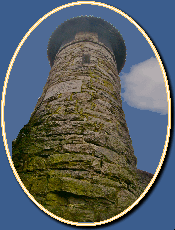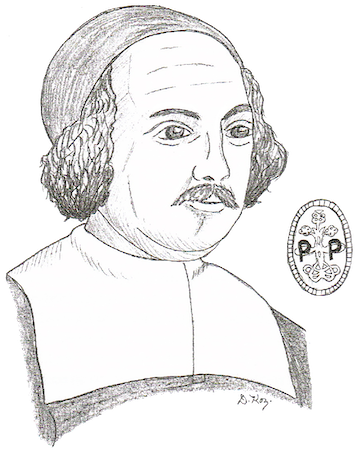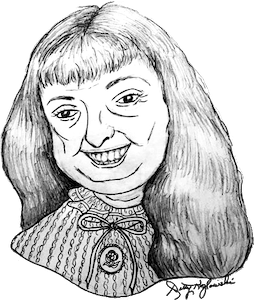Born in Hertfordshire, England in 1601, Peter Prudden was tutored at the Merchant Taylors School for entrance to Cambridge University. After graduation from Emanuel College, Cambridge, he entered the ministry, as did most Oxford and Cambridge graduates. We have little knowledge of his life from his graduation, ca 1623, until 1633. But it may well be that sometime before 1632, Peter and a Jane Thomas were married, for in 1633, a gentleman named Peter Prudden and his wife, and other relatives, contested the probate of William Thomas, Esq. In any case, in 1635 the application of Peter Prudden, Cleric, was received officially as a candidate to leave England and take a ministerial post at Providence Island in the Bahamas. In his application, he mentions two servants, no wife and no children. We can assume then, that Jane Thomas died ca. 1634.
Apparently his application to the Bahamas was turned down since within two years he was completely embroiled in religious revolt against the King’s church and its unbending ways. Still, by the spring of 1637, Prudden was eager to depart for the New World. At the same time, Mr. Theophilus Eaton, a merchant, Samuel Eaton, his brother, and Rev. John Davenport, were making plans to depart for the same destination to found a religious community. The Eatons, Davenport and Prudden each had their own special followers, all of whom were being rigorously persecuted under Charles I for their religious beliefs.
In the spring of 1637, the “Hector,” with Davenport, the Eatons and their followers set sail, arriving at Boston, Massachusetts Bay Colony, on June 26, 1637. Five weeks after, the “Martin,” with Prudden and his flock, joined them in the New World. The Colony at once offered Prudden opportunities and inducements to settle in Dedham.
“11th of Ye 6th month 1637. It is ordered yt if Mr. Peter Prudden, with fifteen more of his company shall please to come unto us, they shall have entertaynment, and lotts accordingly, to be lay’d out to them, bringing stifficat from the Magistrates, as is required.”
Prudden declined their offer, and, notwithstanding this and various other blandishments towards all of the newcomers, the combined groups continued to focus on relocating to a place where they would be free to establish their own religious communities. They deliberated for nine months over their choice for such a location. At one point the Eatons and Rev. Davenport sent out exploring parties to visit, inspect and report back on the sheltered bay and level meadows of Quinnipiac (present day New Haven, CT). Based on favorable reports from this group, they chose Quinnipiac as a site for their new colony.
On March 30, 1638, the Davenport and Prudden groups sailed from Boston, bound for the Quinnipiac. In early April they made landfall and set about the task of establishing a solid foothold upon the shore of the harbor there. The next day being Sunday, April 18th, the company gathered under a huge oak tree (which stood near the present intersection of George and College streets) to hear their pastor, John Davenport, preach from a text from Matthew: “In those days came John the Baptist preaching in the wilderness of Judea.” That afternoon Peter Prudden held forth from Isaiah (repeated in Matthew): “The voice of one crying in the wilderness, Prepare ye the way of the Lord, make his path straight.”
Some time during that summer, Prudden traveled to Wethersfield to preach there. A number of settlers from that town were so taken by his character and intelligence that they accompanied him back to Quinnipiac. Numbering eight families and including Robert Treat, who was to become an especially prominent citizen of the town and the state of Connecticut, this group added much to the life of the new settlement.
The church of the Quinnipiac settlement, (now New Haven, CT) was organized on August 22, 1639. At the same time a separate church was organized, composed of the followers of Rev. Prudden. Plans were already underway for Prudden, his followers from England and his recent converts from Wethersfield to again relocate rather than remain with Rev. Davenport. They purchased a tract of land at Wepawaug (now Milford, CT), and moved there in the late summer or early autumn of 1639. When they relocated, they were a colony of 45 free planters with families, about 200 in all. As a part of the organization, the members chose seven of their numbers as “Pillars.” These were Peter Prudden, William Fowler, Edmund Tapp, Zacheriah Whitman, John Astwood, Thomas Buckingham, and Thomas Welch, with Prudden at the head. Rev. Prudden was ordained Pastor of the Milford church on April 18, 1640.
Prudden was both leader and advisor of his little flock, taking a keen interest not only in affairs of the church but in everything that concerned the life of the community. There is no record he ever received a salary. The people raised and gathered his crops and carted his firewood. He paid his taxes and, though exempt from regular military duty, kept his arms and ammunition in good order. He was a distinguished peace maker and was much beloved and “reverenced” by his people. Cotton Mather spoke highly of his Milford career: “. . . where he lived many years as an example of piety, gravity, and boiling zeal against the growing evils of the times.”
Peter Prudden is recognized as one of Milford’s first settlers on the Memorial Bridge in Milford:
“First Pastor in Milford
Obit 1656
The Voice of one crying in the
Wilderness, Prepare Ye
The Way of the Lord, make His Paths Straight.”
On the Prudden boulder at the southwest end of the bridge is engraved the text of his first sermon preached in the New Haven Colony, and in New Haven, on the afternoon of April 18, 1638, beneath the branches of a big oak tree that stood near the present northwest corner of George and College streets. Along the southern coping runs the inscription “God sifted a whole nation that He might send choice grain into the wilderness.”
Prudden’s home was not far from the Memorial Bridge. His lot extended seven acres and three rods. His garden would serve as the first burial ground of Milford and is now incorporated into the Milford Cemetery just north of the railroad tracks in the center of Milford.
The town was deeply grieved in July, 1656, by the death of its beloved pastor at the age of 56. For almost 17 years he had been the leader and advisor of the growing flock.
Cotton Mather paid the pastor a tribute which has been inscribed on a tablet, erected in the First Church of Christ Congregational, Milford, by Prudden’s descendants:
“Peter Prudden – Founder and Pastor of this Church from
its establishment in 1639 till his death in 1656. I am
sure ‘tis a blessed child of God whose name is before us;
who besides his other excellent qualities was noted for a single
faculty to sweeten, compose, and qualify exasperated spirits,
and stop or heal all contentions – whence it was that his
Town of Milford enjoyed peace with truth all his days.”
“He continued an able and faithful servant of the churches until
the 56th year of his age when his death was felt by the colony as
the fall of a pillar which made the whole fabric to shake.”
It was not until four years from his death that the Milford Congregational Church was able to call a suitable permanent replacement.



